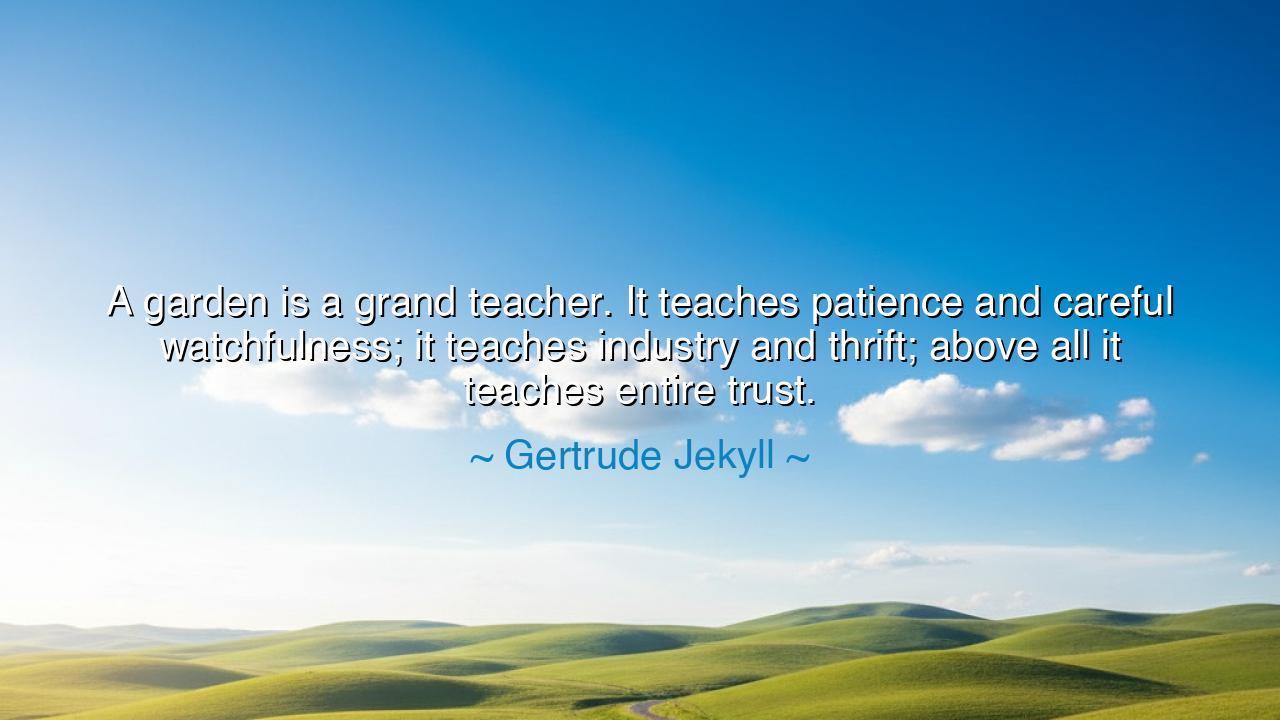
A garden is a grand teacher. It teaches patience and careful
A garden is a grand teacher. It teaches patience and careful watchfulness; it teaches industry and thrift; above all it teaches entire trust.






The English horticulturist and artist Gertrude Jekyll, one of the most influential garden designers in history, once wrote: “A garden is a grand teacher. It teaches patience and careful watchfulness; it teaches industry and thrift; above all it teaches entire trust.” Within this quiet reflection lies the essence of all wisdom—the kind that grows not from books or words, but from the slow and sacred companionship between human hands and the living earth. Jekyll reminds us that the garden is not merely a place of beauty; it is a school of the soul, where one learns the deepest truths of life through soil, seed, and season.
The origin of this wisdom comes from Jekyll’s own lifelong communion with nature. Born in 1843, she spent decades transforming the English countryside into living poetry, designing gardens that seemed to flow like music—each plant, color, and scent placed in harmony. Her artistry sprang from deep observation, from countless hours spent kneeling in the dirt, tending fragile shoots through frost and storm. It was there that she discovered that gardening, like life, cannot be rushed. The soil obeys no command but time, and the gardener must learn the sacred art of patience—to labor today for a beauty that may not come until tomorrow.
When Jekyll speaks of careful watchfulness, she points to the discipline of attention—the quiet vigilance that life demands of all who seek mastery. A true gardener learns to observe the subtlest changes: a leaf that curls, a bud that droops, a hint of pest or drought. In this attentive care, one learns the value of mindfulness, the strength of presence. The same lesson applies to the heart: love, dreams, and virtue all wither without watchfulness. The garden thus becomes a mirror of the inner life—what you neglect will decay; what you tend with care will flourish.
The garden also teaches industry and thrift—that noble balance between effort and resource. Nothing in nature is wasted; every fallen leaf enriches the soil, every withered bloom becomes seed for tomorrow. In the same way, life asks us to work diligently, to honor what we have, to waste neither time nor blessing. The gardener knows that abundance comes not from greed, but from steady, thoughtful labor—the quiet repetition of sowing, watering, and pruning. In this rhythm of toil, the soul learns endurance and gratitude.
Yet Jekyll says that “above all, it teaches entire trust.” This is perhaps the most profound of all the garden’s lessons. For no matter how skilled the gardener, the final outcome lies in hands greater than their own. The seed may sprout or fail; the rain may come or withhold. And so, one must trust—the soil, the season, the mysterious forces that bring life from darkness. This trust is the faith that sustains all creation: to act with devotion even when the results are unseen, to believe that what is buried today will one day bloom. In this, the garden becomes a temple of spiritual surrender.
Consider the life of George Washington Carver, the humble scientist who devoted his life to studying plants and healing the land. He rose from slavery to become one of the most respected agricultural pioneers of his age. But his wisdom was not born of laboratories alone—it was born of communion with the soil. He would rise before dawn to walk among his plants, praying for understanding, trusting the Creator to reveal secrets hidden in petals and roots. Through patience, observation, and faith, Carver transformed the poverty of the South into abundance. Like Jekyll, he learned that the earth rewards those who labor with love and trust.
The lesson, then, is this: life itself is a garden, and we are its caretakers. Cultivate patience when growth is slow. Be watchful over what you love, for neglect is death. Work diligently, but wisely, remembering that every act of care—however small—adds to the harvest of your days. Above all, trust the process. The storms may come, the soil may seem barren, but the unseen hand still works beneath the surface. Every season serves a purpose, and every winter carries the promise of spring.
So, live as the gardener lives—patient, attentive, industrious, and faithful. Sow kindness, nurture hope, and let your heart rest in trust. For as Jekyll teaches, the garden is a grand teacher, and those who learn from it do not merely grow flowers—they grow souls.






AAdministratorAdministrator
Welcome, honored guests. Please leave a comment, we will respond soon